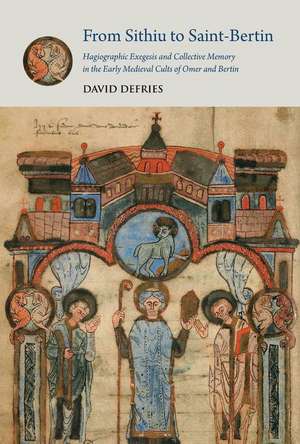From Sithiu to Saint-Bertin
Autor David Defriesen Limba Engleză Hardback – 30 sep 2019
The evolution of Sithiu's collective memory demonstrates that the methods used in most studies of early medieval collective memory produce a distorted image of the partnership. Historians overwhelmingly assume that collective memory has a narrative structure and that the texts meant to shape its evolution are "historiographic" in form. In contrast, David Defries treats Sithiu's historiography as a type of scriptural exegesis that emphasizes the allegorical levels, especially typology and tropology, of the Christian scriptural hermeneutic. Paradigm, not narration, structured early medieval Christian allegory and thus early medieval collective memory at the abbey.
This argument has broad implications for the study of early medieval collective memory. The intellectual culture of Sithiu was typical of the early medieval West, and all the texts considered date between c. 740 and c. 1148, situating them in a period when writers trained in monasteries like Sithiu produced the vast majority of western European literature. From Sithiu to Saint-Bertin may thus be seen as a preliminary case study for the value of paradigmatic approaches to early medieval memory.
Preț: 566.87 lei
Preț vechi: 666.91 lei
-15% Nou
Puncte Express: 850
Preț estimativ în valută:
108.47€ • 113.26$ • 89.57£
108.47€ • 113.26$ • 89.57£
Carte indisponibilă temporar
Doresc să fiu notificat când acest titlu va fi disponibil:
Se trimite...
Preluare comenzi: 021 569.72.76
Specificații
ISBN-13: 9780888442192
ISBN-10: 088844219X
Pagini: 354
Dimensiuni: 169 x 238 x 30 mm
Greutate: 0.73 kg
Editura: PIMS
ISBN-10: 088844219X
Pagini: 354
Dimensiuni: 169 x 238 x 30 mm
Greutate: 0.73 kg
Editura: PIMS
Notă biografică
David Defries received his doctorate from The Ohio State University and a Licence in Mediaeval Studies from the Pontifical Institute of Mediaeval Studies, Toronto and taught at the University of Tennessee before joining the Department of History at Kansas State University, where he is currently Associate Professor. His essays have appeared in Early Medieval Europe, Hagiographica, History Compass, and Mediaeval Studies, among other journals, as well as in recent collections on textual transmission and on hagiography and the history of Latin Christendom. He is currently at work on a history of Flanders and the world of the North Atlantic, from 864 to 1127.
